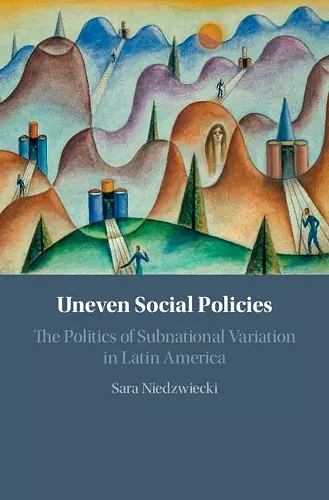Uneven Social Policies
The Politics of Subnational Variation in Latin America
Format:Hardback
Publisher:Cambridge University Press
Published:6th Sep '18
Currently unavailable, and unfortunately no date known when it will be back
This hardback is available in another edition too:
- Paperback£28.80was £32.00(9781108454896)

Social policies can transform the lives of the poor, yet subnational politics and state capacity often inhibit their success.
Uneven Social Policies explains why some policies are implemented more effectively than others, why this variation is particularly relevant within countries, and why some policies deliver votes to incumbent governments while others do not. This book will appeal to readers interested in comparative politics, multilevel governance, the welfare state, and Latin American politics.Social policies can transform the lives of the poor and marginalized, yet inequitable implementation often limits their access. Uneven Social Policies shifts the focus of welfare state analysis away from policy design and toward policy implementation. By examining variation in political motivations, state capacity, and policy legacies, it explains why some policies are implemented more effectively than others, why some deliver votes to incumbent governments while others do not, and why regionally elected executives block the implementation of some but not all national policies. Niedzwiecki explores this variation across provinces and municipalities by combining case studies with statistical analysis of conditional cash transfers and health policies in two decentralized countries, Argentina and Brazil. The analysis draws on original data gathered during fifteen months of field research that included more than 230 interviews with politicians and 140 with policy recipients.
'Two giant federal states - Argentina and Brazil - legislated national programs for conditional cash transfers and primary health care benefits recently. But why are they implemented in such radically uneven ways? This book provides a surprising, complex set of answers and shows the crucial importance of 'credit claiming' in the subnational space.' Stephan Leibfried, Universität Bremen, Germany
'In this well researched and insightful book, Sara Julieta Niedzwiecki draws much needed attention to the important role of subnational politics in explaining how broadly targeted, patronage-free social policies often undergo uneven implementation across municipalities and states in decentralized countries. The local political dynamics she emphasizes, aimed at enhancing or hindering the implementation of national policies, have relevance far beyond the specific cases she analyzes.' Wendy Hunter, University of Texas, Austin
'This masterful book breaks with years of conventional wisdom by showing that it is not just poor state capacity that shapes the delivery of social policy in Latin America. Politicians make calculated choices to facilitate or obstruct policy implementation based on the degree to which they can claim credit for policies. This book makes multiple contributions to a number of important literatures, including scholarship on the welfare state, public policy, federalism, and subnational politics. On the basis of rigorous research integrating multiple methods, including months of observation, interviews, and an original dataset on political alignments, institutional strength, and subnational policy outcomes, Niedzwiecki convincingly accounts for differences in political choices and policy outcomes across sectors. Directing our attention to the conflicts and strategic decisions in the terrain of policy implementation, which determine whether and how Latin Americans receive the health care and income support politicians promise them, this book is a must-read for students, scholars, and policy makers.' Mala Htun, University of New Mexico
'Uneven Social Policies shows how credit-claiming and co-partisanship at the subnational level can improve or diminish the prospects for the effective implementation of nationwide social policies. The book's findings have implications for social policy design and implementation not only in middle-income Latin American countries, but in decentralized countries around the world. By illuminating forces and conditions that help to bring about, or obstruct, social policy reforms that benefit the previously excluded, Uneven Social Policies identifies critical points at which policymakers and the public can intervene to promote policies in the interest of the poor.' James W. McGuire, Wesleyan University, Connecticut
'… outstanding … carefully researched. This is a very rich book and multiple conclusions can be derived from the analysis, including the important roles that subnational governments and policy implementation have in linking the policy processes with outcomes.' Silvia Borzutzky, Latin American Research Review
ISBN: 9781108472043
Dimensions: 236mm x 157mm x 20mm
Weight: 500g
272 pages